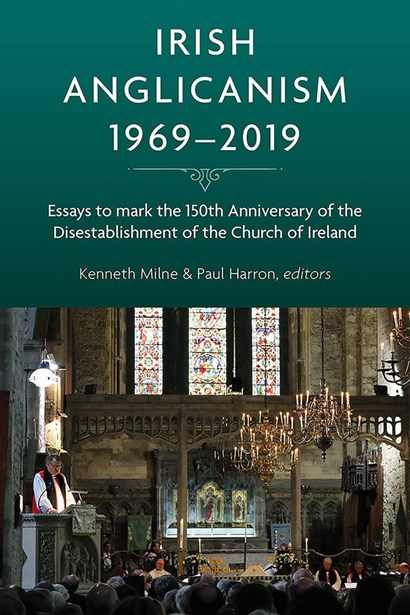Irish Anglicanism 1969-2019, edited by Kenneth Milne and Paul Harron
Bishop Chillingworth writes in The Church Times, 13 March, 2020.
The disestablishment — and disendowment — of the Church of Ireland under the terms of the Irish Church Act of 1869 is described by Dr Kenneth Milne, one of the editors of this volume, as “a prime example of an event that was regarded at the time as little short of a catastrophe for the Church but can now be seen as having been its salvation”.
While this book marks the 150th anniversary of the 1869 Act, contributors were asked to focus on the diversity of the life of the Church of Ireland during the 50 years since the centenary in 1969, and to reflect on the all-Ireland nature of the Church.
Those 50 years have brought unprecedented change and challenge in both parts of Ireland. Most obviously, the 30-year conflict in Northern Ireland has, as Dr Milne suggests, had “considerable political and security implications for the whole island”.
The Republic has experienced little short of a political transformation in the removal of the territorial claim over Northern Ireland and the progressive liberalisation through a series of referenda of laws on divorce, contraception, same-sex or equal marriage, and abortion. The position of the Roman Catholic Church is utterly changed. Both Northern Ireland and the Republic have increased rapidly in ethnic diversity.
The contributions to this book tell a story of deep faithfulness and, at times, extraordinary vision. In the spirit of a disestablished Church, there is a remarkable level of dedicated voluntary effort on the part of the laity of the Church.
Even a brief survey of the material must note changes such as the ordination of women as priests and bishops — and a reluctance to make any special provisions that would compromise the integrity of that move. Bishop Harold Miller charts the process of liturgical change which led towards the publication of the 2004 Book of Common Prayer. Of particular interest is the process that led to the Covenant with the Methodist Church in 2002. Here, a pathway has been creatively found through which issues around episcopal ordination can be resolved.
Beyond those, there are important chapters on education, youth work, ecumenism, communications, pastoral care, theological training, the Anglican Communion, and others. Those with an interest in church administration will want to read of the significant impact on the life and finances of the Church of Ireland of the financial crash of 2008 and the collapse of the Irish banks.
The segmental “book of record” approach to this task tells the story in a fascinating way — and there is much to celebrate. But I was drawn to the more thematic and holistic material.
In “The Church of Ireland: Politics and social change”, the Bishops of Clogher and Cashel draw attention to the way in which the end of the Troubles in Northern Ireland had the “peculiar consequence” of reducing the empathy of the southern Church with the northern Church — particularly in their responses to their very different contexts. Around the issues of human sexuality, this came to a head at the General Synod of 2012, which was “for many the most divisive synod in living memory”. There are challenges ahead.
The Rt Revd David Chillingworth is a former Primus of the Scottish Episcopal Church.
Irish Anglicanism 1969-2019: Essays to mark the 150th anniversary of the disestablishment of the Church of Ireland
Kenneth Milne and Paul Harron, editors
Four Courts Press £30
(978-1-84682-819-5)
Church Times Bookshop £27
Note – this book is currently being re-printed
DraggedImage.340671b52d944aa6bf9dc3f6256bf68c.png



